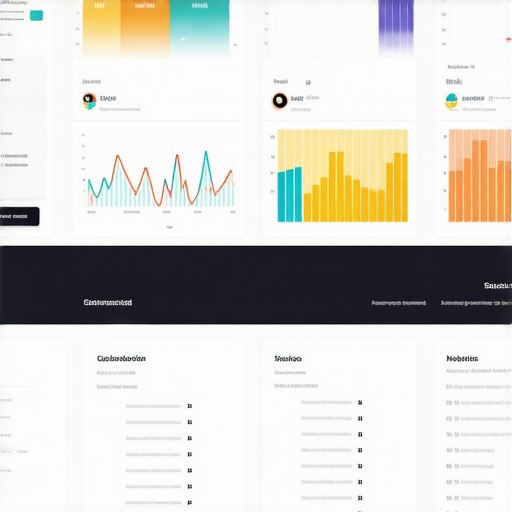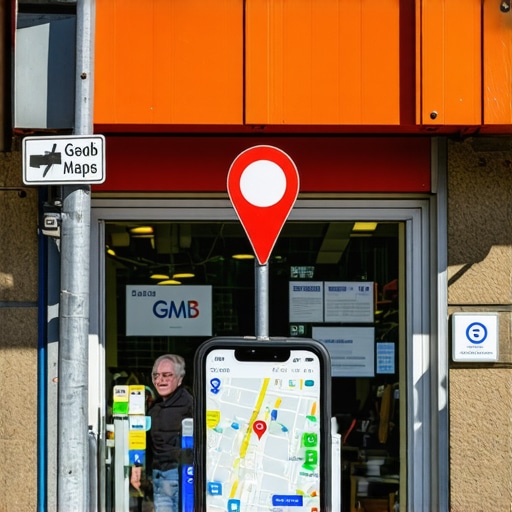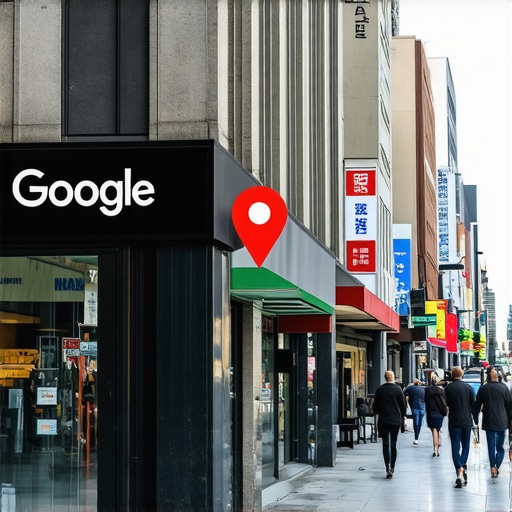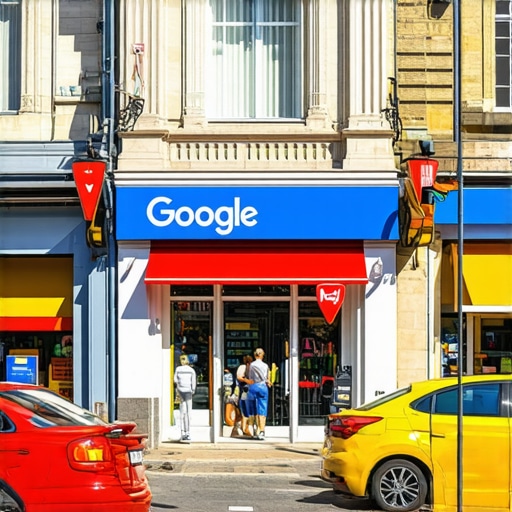Boost Your GMB Visibility: Proven Local SEO Strategies for Google Business
Unlocking the Depths of Local SEO: A Strategic Perspective for Google Business Success
In the fiercely competitive landscape of local search, understanding the nuanced interplay of ranking factors is paramount for businesses aiming to dominate their geographic niche. As a seasoned SEO strategist, I recognize that elevating your Google My Business (GMB) visibility transcends basic optimization; it requires a layered, data-driven approach rooted in the latest algorithmic insights and user behavior analytics. This comprehensive exploration delves into sophisticated tactics that empower businesses to not only improve their local search rankings but also foster authentic customer engagement.
How Do Advanced Local SEO Tactics Influence GMB Ranking Dynamics?
At the core, local SEO is governed by a complex system where signals such as proximity, relevance, and prominence intertwine. Implementing advanced strategies—like leveraging structured data markup, optimizing for voice search, and harnessing machine learning insights—can significantly enhance a business’s authority and visibility. For instance, integrating schema markup for local businesses enriches search snippets, making them more compelling and clickable, thus increasing traffic. Moreover, continuous monitoring through tools like Google Search Console and local rank trackers provides critical feedback loops to refine tactics in real-time.
What Role Does Content Innovation Play in Strengthening Google Business Profiles?
Innovative content, including rich media, customer-generated reviews, and interactive posts, amplifies user engagement metrics that search engines interpret as signals of credibility. A strategic content calendar aligned with seasonal trends and local events ensures relevance and freshness. Additionally, incorporating LSI keywords such as “local SEO optimization,” “Google Maps ranking,” and “GMB profile enhancement” organically within posts not only boosts semantic relevance but also addresses evolving search intents. For example, regularly updating your GMB with high-quality images and detailed service descriptions improves both user experience and algorithmic trustworthiness.
How Can I Effectively Manage and Respond to Negative Reviews Without Undermining My Authority?
Handling negative reviews requires a nuanced approach that demonstrates professionalism and a commitment to customer satisfaction. Publicly responding to criticism with personalized, empathetic messages can mitigate damage and even convert dissatisfied clients into brand advocates. It’s essential to analyze review patterns to identify systemic issues and implement targeted improvements. From an SEO standpoint, encouraging satisfied customers to leave positive reviews, while maintaining transparency, enhances your profile’s credibility and search rankings. For detailed review management tactics, consult authoritative sources such as Moz’s Local SEO guidelines.
For further insights into top-tier Google Business optimization, explore our advanced SEO tips for peak performance or contact our expert team through the contact page. Your strategic investments today will yield measurable local dominance tomorrow.
Are You Overlooking the Power of Local SEO Innovation for GMB Dominance?
While many businesses focus on standard optimization tactics, the true edge in local search often lies in innovative, data-driven strategies that anticipate evolving search engine algorithms. For example, integrating AI-powered insights to predict trending keywords and customer intent can give your GMB profile a competitive boost. According to Moz’s comprehensive local SEO guidelines, staying ahead requires continuous adaptation and leveraging cutting-edge tools like local rank tracking and structured data enrichment to maintain visibility and relevance. Implementing these tactics not only elevates your rankings but also enhances customer trust and engagement.
How Can Advanced Schema Markup Transform Your GMB Visibility?
Structured data markup, particularly schema.org for local businesses, acts as a translator between your website and search engines, providing explicit context about your services, location, and offerings. When properly implemented, schema markup can lead to rich snippets, voice search optimization, and improved click-through rates. For example, adding FAQ schema to your profile can address common customer questions directly within search results, reducing friction and increasing conversions. To master this, consider consulting expert resources like Google Business SEO growth tactics that detail schema best practices for maximum impact.
What Are the Practical Steps to Integrate Voice Search Optimization Into Your Local SEO Strategy?
Voice search is rapidly transforming local SEO, demanding a shift in content and keyword strategies. To effectively optimize, focus on long-tail conversational keywords, natural language queries, and featured snippet opportunities. Conduct keyword research around common voice queries like “Where is the best sushi near me?” and tailor your GMB content to answer these questions succinctly. Additionally, ensure your NAP (Name, Address, Phone Number) details are consistent across all platforms, as voice assistants rely heavily on authoritative data. For an in-depth guide on voice search optimization, explore our advanced SEO tips.”
If you found these insights valuable, consider sharing your thoughts or asking questions in the comments. For more expert advice, don’t hesitate to reach out through our contact page. Your strategic moves today will secure your local dominance tomorrow.
Leveraging Structured Data and AI Insights for Hyper-Targeted Local SEO Campaigns
In the ever-evolving landscape of local search, harnessing the power of structured data markup combined with artificial intelligence (AI) insights can be a game-changer. Implementing schema.org types specific to local businesses—such as LocalBusiness, Restaurant, or MedicalClinic—enables search engines to better understand your offerings, leading to enriched search results and higher click-through rates. According to Search Engine Journal, advanced schema implementation can increase visibility by providing contextual clues that activate rich snippets, thereby making your listing stand out in competitive local searches.
Coupling this with AI-driven keyword research tools, like BrightLocal’s Local Search Grid or SEMrush’s Position Tracking, allows for predictive insights into emerging local search trends. These tools analyze search patterns, customer behavior, and seasonal variations, enabling proactive optimization strategies that keep your GMB profile ahead of the curve. The synergy of structured data and AI ensures your content remains relevant and authoritative, directly impacting your local ranking prominence.
The Nuances of Voice Search Optimization for Local Intent
Voice search continues its rapid ascent, with Statista estimating that over 50% of searches will be voice-based by 2024. For local businesses, optimizing for voice search entails more than just keyword stuffing; it requires a nuanced understanding of conversational language, question intent, and semantic relevance. For example, rather than targeting a keyword like “best pizza,” tailor your content to answer questions like “Where can I find the best pizza nearby?”
Implementing structured data for FAQs, utilizing long-tail natural language keywords, and maintaining NAP consistency across all platforms are critical steps. Moreover, employing tools like Google’s People Also Ask feature can reveal common voice query patterns, guiding content refinement. For a comprehensive approach, consider integrating voice search optimization into your existing local SEO strategy, ensuring your GMB profile provides direct, concise answers that voice assistants can easily relay.
How Do You Measure the Effectiveness of Advanced Local SEO Tactics in Real-Time?
Measuring success in sophisticated local SEO requires a multi-layered approach. Beyond traditional metrics like rankings and traffic, advanced tools such as BrightLocal’s Local Rank Tracker, Google Data Studio dashboards, and heatmaps from Crazy Egg provide granular insights. These tools track not only positional shifts but also user engagement metrics such as click-through rates, bounce rates, and conversion rates specific to local search traffic.
Implementing A/B testing for different schema configurations or content variations can reveal what resonates most with your local audience. Additionally, monitoring reviews and sentiment analysis through tools like ReviewTrackers or reputation management platforms can offer qualitative insights into customer perception shifts resulting from your optimization efforts. Regularly analyzing these indicators ensures your strategies remain aligned with evolving search engine algorithms and user expectations, fostering continuous improvement.
If you’re ready to elevate your local SEO game, exploring these advanced methodologies is essential. For tailored advice, connect with our experts or explore our in-depth resources that delve into the intricacies of local search optimization, ensuring your business remains at the forefront of your community’s digital landscape.
Harnessing the Power of AI-Driven Local Search Optimization
In the quest for local search supremacy, integrating artificial intelligence (AI) with traditional SEO tactics offers unparalleled potential. AI algorithms can analyze vast datasets—such as customer reviews, search patterns, and behavioral trends—to refine keyword targeting and predict emerging local search queries. Implementing tools like Google’s BERT update insights or neural network-powered analytics enables businesses to adapt dynamically, ensuring their Google My Business (GMB) profiles remain highly relevant and visible.
The Impact of Structured Data on Rich Snippets and Customer Engagement
Advanced schema markup implementation, beyond basic LocalBusiness types, can include detailed product schemas, event data, and service-specific microformats. Such granular structured data enhances the likelihood of rich snippets, directly influencing click-through rates and customer engagement. For instance, embedding comprehensive FAQ schemas can preemptively answer common inquiries within search results, reducing friction and increasing conversions. According to Search Engine Land’s technical guidelines, meticulous schema deployment is instrumental in elevating local visibility in competitive markets.
What Is the Future of Voice Search Optimization in Local SEO?
As voice assistants become ingrained in daily life, optimizing for natural language queries and long-tail conversational keywords is essential. Future-proof strategies include leveraging semantic SEO to understand user intent deeply and developing content that answers specific questions succinctly. Furthermore, maintaining NAP consistency and integrating location-specific schema ensures voice search results are accurate and trustworthy. According to a report by ComScore, over 70% of local mobile searches will be voice-based by 2025, highlighting the urgent need for proactive voice search strategies.

How Can Advanced Analytics Drive Continuous Improvement in Local SEO Campaigns?
Real-time analytics—using platforms like Google Data Studio, Hotjar, and advanced CRM integrations—provide granular insights into user interactions, conversion funnels, and engagement metrics. These insights enable marketers to perform A/B testing on various schema configurations, content formats, and review management tactics, fostering a culture of continuous optimization. Additionally, sentiment analysis tools can gauge customer perception shifts following strategic adjustments, informing future initiatives. The integration of such sophisticated data analytics transforms local SEO from a reactive process into a proactive, predictive discipline.
Why Is Mobile-First Optimization Critical for Local SEO Success?
With over 80% of local searches occurring on mobile devices, a mobile-first approach is non-negotiable. Optimizing website loading speeds, ensuring responsive design, and enhancing user experience directly influence local rankings. Google’s mobile usability updates emphasize the importance of seamless navigation and fast performance, which are critical for retaining visitors and encouraging conversions. Furthermore, mobile-centric features like click-to-call and location-aware prompts improve customer interactions, driving foot traffic and online engagement in tandem.
How Do You Strategically Integrate Hyper-Local Data for Explosive Growth?
Utilizing hyper-local data—such as neighborhood demographics, foot traffic patterns, and local event calendars—enables hyper-targeted marketing campaigns. Integrating data from sources like Foursquare or local government open data portals can reveal untapped markets and niche customer segments. Tailoring content, promotions, and ad campaigns based on these insights fosters deeper community engagement and brand loyalty. For example, aligning promotional offers with local festivals or community events can significantly boost visibility and customer trust. Embrace these cutting-edge data sources to unlock exponential growth opportunities for your local SEO efforts.
To stay ahead in the ever-evolving landscape of local search, continuous innovation and data-driven decision-making are vital. For expert guidance tailored to your industry, connect with our specialized team or explore further resources designed to elevate your Google My Business dominance.
Expert Insights & Advanced Considerations
1. Leveraging AI-Powered Data Analysis for Predictive Optimization
Integrating artificial intelligence with local SEO allows for precise prediction of emerging search trends and customer preferences, enabling proactive adjustments to your Google My Business (GMB) profile. Utilizing tools that analyze search pattern data can significantly enhance your visibility in competitive local markets.
2. Implementing Granular Schema Markup for Rich Snippets
Beyond basic schema types, deploying detailed, microdata schemas tailored to your industry can unlock enhanced rich snippets, increasing click-through rates and customer engagement. Expert implementation of structured data ensures your profile stands out in search results.
3. Prioritizing Voice Search Optimization with Natural Language Content
Optimizing for voice search involves crafting content that addresses conversational queries and long-tail keywords. Ensuring NAP consistency and utilizing FAQs with schema markup make your business accessible through voice assistants, capturing local voice-based inquiries.
4. Harnessing Hyper-Local Data for Targeted Campaigns
Utilizing hyper-local demographic and behavioral data enables hyper-targeted marketing campaigns, fostering community engagement and loyalty. Data sources like local event calendars and foot traffic analytics can refine your localized outreach strategies.
5. Continuous Real-Time Analytics for Agile Strategy Refinement
Employing advanced analytics platforms such as Google Data Studio and heatmaps facilitates real-time assessment of user behavior and engagement metrics, allowing for swift strategic pivots that sustain and improve your local SEO performance.
Curated Expert Resources
- Google’s Official Guidelines for Structured Data: Essential for implementing industry-specific schema, ensuring your rich snippets are correctly formatted and impactful.
- Moz’s Local SEO Resources: Offers comprehensive insights into local search ranking factors and optimization techniques from industry leaders.
- BrightLocal’s Local Search Data Tools: Provides predictive analytics and hyper-local data for targeted campaign planning.
- Search Engine Journal’s Technical SEO Articles: Deep dives into schema markup, voice search, and AI integration strategies.
- Google’s Voice Search Optimization Guides: Practical advice on capturing voice-based local search traffic effectively.
Final Expert Perspective
In the realm of local SEO, mastering the nuanced interplay of AI-driven insights, granular schema implementation, and hyper-local data integration is essential for achieving and maintaining Google Business dominance in 2024. These advanced strategies, rooted in authoritative resources and continuous analytics, empower businesses to stay ahead of ever-evolving search algorithms and user behaviors. Engaging with these expert insights will not only elevate your visibility but also foster authentic, long-term customer relationships. For those committed to excellence, exploring these tactics further can transform your local search presence into a formidable competitive advantage. To delve deeper into sophisticated local SEO strategies, contact our expert team or visit our consultation page.






